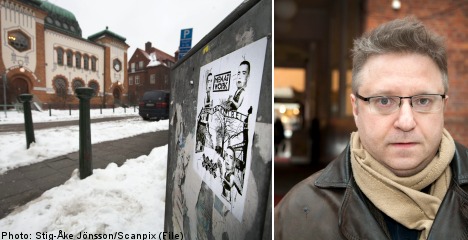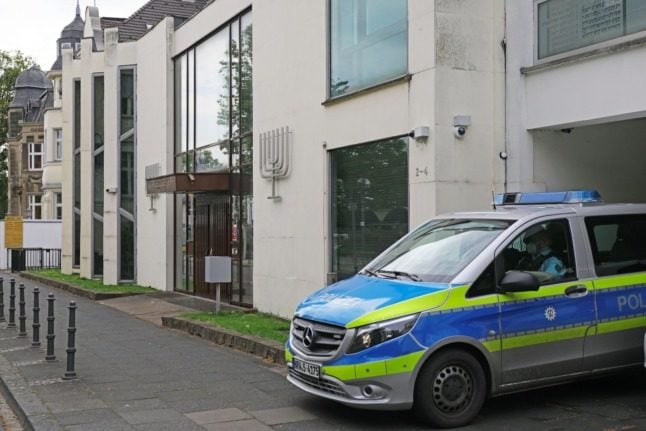The past couple of years have been turbulent for Malmö’s Jewish community. A spike in anti-Semitic attacks in 2009 prompted a number of Jews to leave the city altogether, concluding they would never feel accepted there.
Controversial comments by the town’s long-serving Social Democratic mayor Ilmar Reepalu also put Malmö in the spotlight, drawing criticism from within his own party, as well as from influential Jewish organisations aboard.
And in December 2010, the US-based Simon Wiesenthal Center issued a warning urging Jews to exercise “extreme caution” when traveling in southern Sweden.
While current statistics show a significant decline in anti-Semitic attacks in 2010 when compared to 2009, the nearly 3,000-member Jewish community in Skåne continues to shrink.
“People wonder if there will even be a Jewish community here in 10 years,” Fredrik Sieradzki, spokesperson for the Jewish Community of Malmö (Judiska Församlingen i Malmö), tells The Local.
Despite the decrease in reported attacks, as well as community efforts to ease racist rancor, many of south Sweden’s Jewish residents continue to feel dangerously threatened.
According to Sieradzki, many young Jewish families are relocating because they feel Skåne is not a safe area to raise their children. Coupled with an aging baby-boomer generation, there are few willing or present to take vacated leadership positions within many of the area’s Jewish organisations.
“Some of us feel there is no hope and we are losing people because of anti-Semitism,” he adds.
Police reports show the number of anti-Semitic incidents nearly doubled in 2009 but have declined in 2010 by more than half.
“We believe the number of attacks increased in 2009 due to the Davies Cup and two big demonstrations against Israel. Now the statistics show hate-crime against Jews going down dramatically in 2010,” explains Susanne Gosenius, a hate crime coordinator for Skåne police.
Sieradzki argues, however, that the numbers may not reflect reality as many Jewish residents choose not to report every incident, such as intimidating slurs and other verbal attacks.
“Maybe the numbers are lower or maybe not. It doesn’t matter because the feeling is the same – many of us cannot and do not feel at home here,” says Sieradzki.
He points out that the severity of attacks is also intensifying.
Last October a group of about 20 teenagers attacked the Jewish community’s residential education centre during a youth retreat.
“The first night they shouted vicious, nasty slurs. The next night it escalated and they broke down the fence and were banging on windows and doors,” Sieradzki explains.
“It was quite frightening.”
Sieradzki, who applauded the nearby municipality of Vellinge for its swift response to the incident, also points out that the teenagers in the attacking group were not Muslim as many are quick to assume.
“These boys were not Arabs. They were all Swedish. And I assure you the Jewish people are not attacking anybody.”
Despite the year’s decline in reported attacks, the Simon Wiesenthal Center, the largest international organization for Jewish human rights, nevertheless went ahead with its decision to issue a travel warning for Jews visiting southern Sweden.
The move put Skåne to the same plane as countries that have experienced heinous, even fatal attacks and bombings on Jewish people, such as Turkey, Greece and Belgium.
“We made a very serious statement by putting Malmö on our advisory list,” Rabbi Abraham Cooper, Associate Dean of the Center, tells The Local.
“It’s a serious move and we hope to take serious measures to rectify it.”
But the warning rankled some members of Malmö’s Jewish community, who claim they weren’t informed about the move ahead of time, and surprised local authorities as statistics showed that attacks were on the decline.
“I can understand that Jewish people feel threatened in Malmö,” hate crimes specialist Gosenius explains.
“We have a huge population from the Middle East, West Bank and Gaza and most (Jewish) victims describe their perpetrators as young Muslim men.
“But I’m not sure the warning for Malmö fits. It’s a very drastic act.”
Sieradzki has mixed emotions about the Wiesenthal Center’s “surprise” advisory.
While he understands the Center’s point, he argues the move may have been too severe and feels the Jewish leaders in Skåne could have helped moderate the message had they known about it.
“They should have talked to us first,” argues Sieradzki.
“We are trying to create an atmosphere in Malmö where we co-exist and I’m not sure that this travel warning is good.”
Rabbi Cooper rejects the idea that the Center’s warning came as a surprise, pointing to a meeting in Stockholm prior to the advisory where prominent members of south Sweden’s Jewish community were in attendance.
“The analysis comes from the ground up,” says Cooper.
“Experiences from Jewish members in Malmö and a previous colleague there led to what we did.”
He stated that families should be able to go to any house of worship, whether it’s Fridays, Saturdays or Sundays, without fear of intimidation, violence or something worse.
“People of faith, or no faith, should be able to walk on the street and feel equally protected. There is a climate of intimidation in Malmö and we need to take steps to address it,” says Cooper.
In response to 2009’s hike in attacks, Malmö city officials created the Dialogue Forum to ease hostilities between Jews, Muslims, the Roma, and other victimized minorities.
As the Forum’s one-year anniversary approaches, the Jewish community believes the dialogue has had little effect.
“It’s sad we have to have a group, and we do hope something good comes of it but there hasn’t been anything yet,” says Sieradzki, adding that the 6,000-member Islamic Centre, of their own initiative, recently invited members of the Jewish community to their mosque.
Mayor Reepalu, who was also singled out by the Wiesenthal Center last year for comments about the city’s Jewish community in which he “blamed the situation on the Jews themselves as the community did not ‘distance itself from Israel,'” according to the Center.
While Reepalu refused to be interviewed for this article, he has undertaken efforts in the last year to make amends and further understand the hostilities Jewish people encounter in Malmö through meetings with Sieradzki and other Jewish community leaders.
Since then the 15-year mayor has invited members from the Simon Wiesenthal Center to Malmö, although an exact date for the visit has not yet been set.
“I can confirm we are coming to Sweden and we are coming next month,” says Rabbi Cooper.
While the agenda for the meeting is still being hammered out, the focus will likely be on improving the situation in southern Sweden.
The meeting will be also accompanied by a seminar on anti-Semitism and Islamophobia.
“It’s good that something is happening,” says Sieradzki.
“There are Jews is Malmö. We live here, we are here to stay and we won’t gain anything by attacking each other.”



 Please whitelist us to continue reading.
Please whitelist us to continue reading.
Member comments